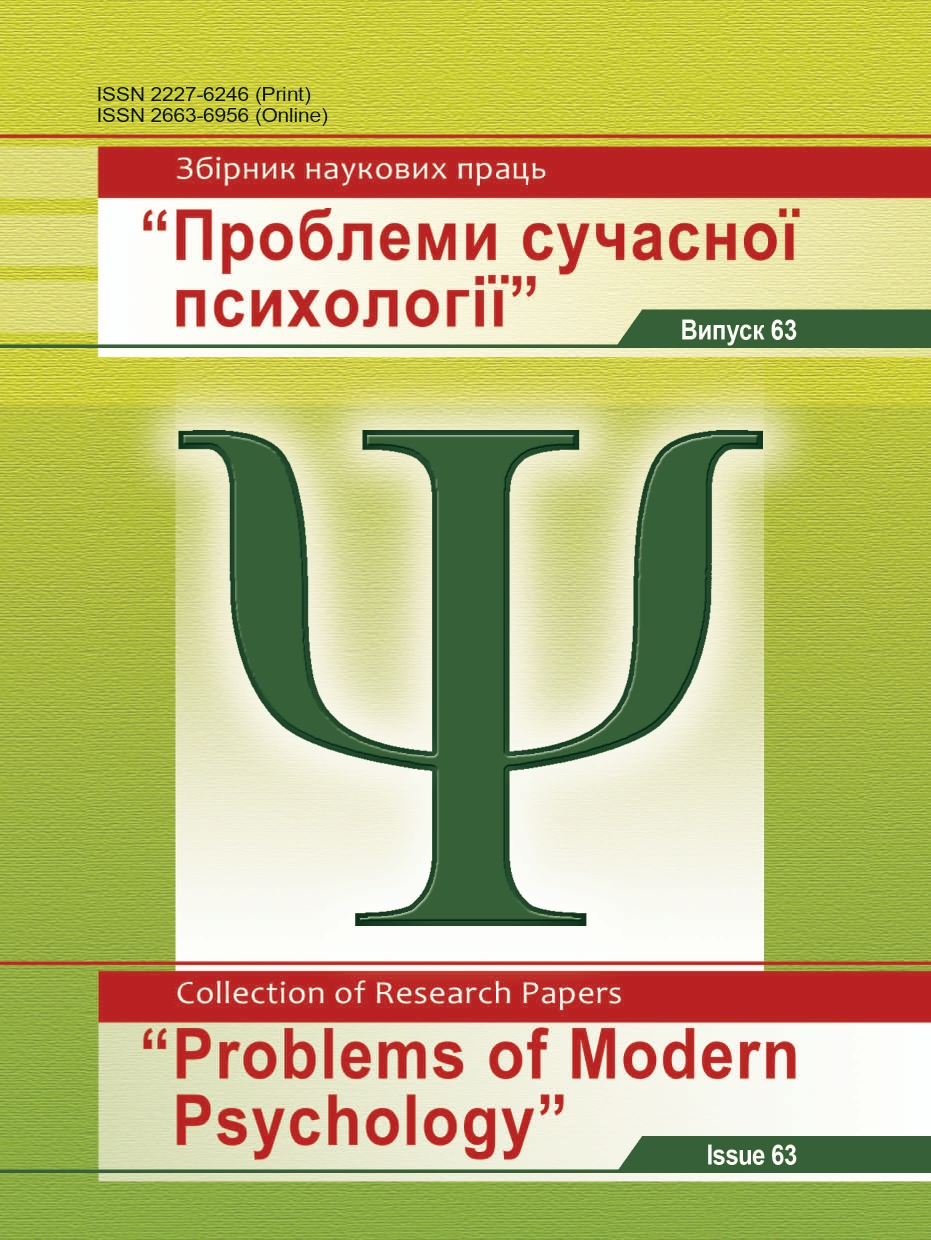Співвідношення визначень загального та соціального інтелекту в емпіричному дослідженні педагогів закладів дошкільної освіти
DOI:
https://doi.org/10.32626/2227-6246.2024-63.48-68Ключові слова:
інтелект, загальний інтелект, соціальний інтелект, когніції, почуття, сприйняття, пам’ять, уявлення, уява, мислення, соціальне уявленняАнотація
Мета статті: проаналізувати феноменологічний науковий підхід для характеристики загального інтелекту особистості; окреслити структуру інтелекту як базової загальної категорії, описати проблеми його походження з огляду на базову сутність включати в одне поняття «вічні», «планетарні» проблеми; описати вимірювальний (або тестологічний) науковий підхід для характеристики загального інтелекту людини; запропонувати характеристики теорії асоційованих систем; вивчити проблему загального та соціального інтелекту, проаналізувати співвідношення цих визначень на думку педагогів дошкільних закладів освіти.
Методи дослідження. Для розв’язання поставлених завдань використовувалися такі теоретичні методи дослідження: категоріальний, структурно-функціональний, аналіз, систематизація, моделювання, узагальнення. Також у своєму дослідженні ми використовували емпіричні методи, такі як констатувальне дослідження.
Результати дослідження. Доведено, що когнітивний напрямок щодо дослідження соціального пізнання значно збагатив психологію сутності та змісту соціального інтелекту, яка раніше розвивалася в психометричній традиції, а завдяки когнітивній психології фасилітувало актуалізацію понять соціальної репрезентації. Показано, що аналіз існуючих моделей репрезентацій соціального знання свідчить про те, що найбільшу увагу в історії когнітивної психології було приділено саме абстрактним репрезентаціям, а існуючі ментальні моделі (які стосуються як словесних, так і образних форматів презентації інформації) не піддавались систематичній перевірці. Крім того, функціонування зазначених моделей, як правило, відіграє провідну роль у такій галузі соціального пізнання як актуалізація процесів соціальної категоризації і стереотипного мислення, в галузі сприйняття психологічних рис, формування першого враження, розуміння суб’єктів міжособистісної взаємодії тощо. Така ситуація, разом з цим, задає перспективи проведення подальших емпіричних досліджень щодо становлення соціального інтелекту.
Висновки. Показано, що інтеле́кт (від лат. intellectus – відчуття, сприйняття, розуміння, поняття, розум) – якість психіки, що покладена в основу здатності адаптуватися до нових ситуацій, здатності до навчання на основі набутого особистісно значущого досвіду, розуміння і застосування як конкретних, так й абстрактних концепцій до використання своїх знань з метою здійснення впливів на навколишнє середовище та управління ним. Інтелект визначається як загальна здатність особистості до пізнання і розв’язання проблем, задач та завдань, яка об’єднує всі пізнавальні процеси, когніції людини: відчуття, сприйняття, пам’ять, уявлення, уяву і мислення.
##submission.downloads##
Опубліковано
Як цитувати
Номер
Розділ
Ліцензія
Авторське право (c) 2024 Івашкевич Едуард, Гудима Олександр

Ця робота ліцензується відповідно до Creative Commons Attribution-NonCommercial 4.0 International License.
Редакція має повне право публікувати у Збірнику оригінальні наукові статті як результати теоретичних і експериментальних досліджень, які не знаходяться на розгляді для опублікування в інших виданнях. Автор передає редколегії Збірника права на розповсюдження електронної версії статті, а також електронної версії англомовного перекладу статті (для статей українською та російською мовою) через будь-які електронні засоби (розміщення на офіційному web-сайті Збірника, в електронних базах даних, репозитаріях та ін).
Автор публікації зберігає за собою право без узгодження з редколегією та засновниками використовувати матеріали статті: а) частково чи повністю в освітніх цілях; б) для написання власних дисертацій; в) для підготовки абстрактів, доповідей конференцій та презентацій.
Автор публікації має право розміщувати електронні копії статті (у тому числі кінцеву електронну версію, завантажену з офіційного web-сайту Збірника) на:
- персональних web-ресурсах усіх Авторів (web-сайти, web-сторінки, блоги тощо);
- web-ресурсах установ, де працюють Автори (включно з електронними інституційними репозитаріями);
- некомерційних web-ресурсах відкритого доступу (наприклад, arXiv.org).
Але в усіх випадках обов’язковою є наявність бібліографічного посилання на статтю або гіперпосилання на її електронну копію, що містяться на офіційному сайті Збірника.






